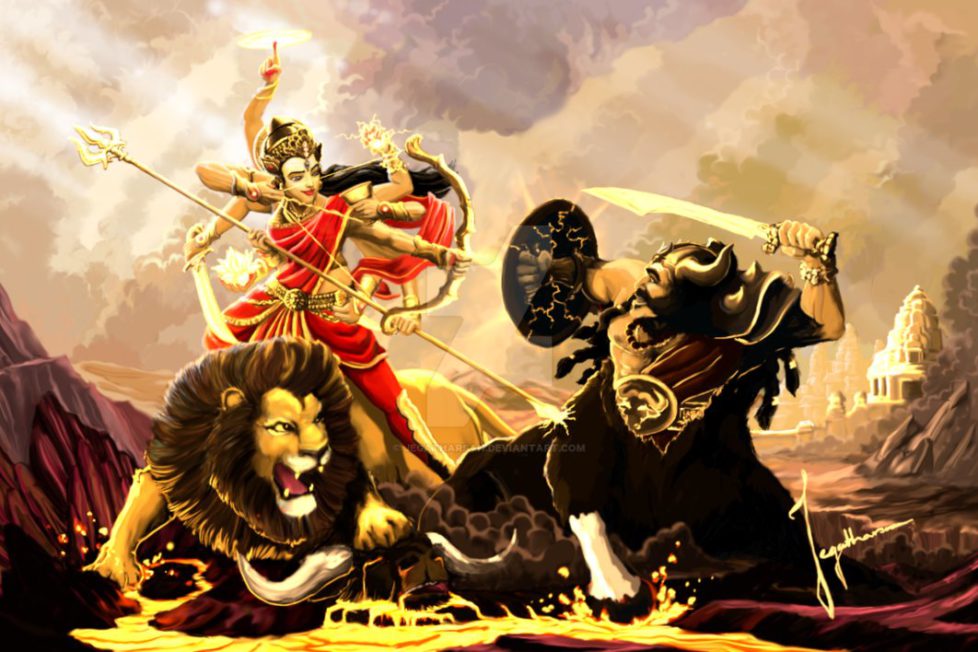Ayudha Puja is not about Books and Cars but Durga’s weapons


Kerala revives real Ayudha Puja with the clarion call from Hindu Seva Kendram.
Navaratri is a sacred time across India as all Hindus celebrate Navaratri, a 9 day festival in reverence of Durga, an aspect of Devi. According to the Puranas, the goddess Durga slays the demon Mahishasura with her trident, and then she lays down her weapons and disappears. Devas thank her for her aid and worship the celestial weapons she left behind.
This Hindu tradition of worshipping weapons that destroy the forces of evil dates back thousands of years.
Sanathana Dharma, Hindu societies, Hindu nations, Hindu political power, and fighting in the name of our traditions are different parts of the same Hindu body. Sanathana Dharma became “Sanathana” through numerous cycles of wars. India’s ancient Hindu traditions were not protected and preserved by studies and song, but by the sword. The tradition of performing shastra pooja (weapon-worship) is evidence of this, and its practice has been repeatedly recorded in Hindu history. It was once performed in almost every Hindu household during Navaratri. In the preservation of our Dharma, the pursuit of shastras (weapons) is as important if not MORE, than the pursuit of shaastras (sciences). The practice of shastra pooja was an important aspect of Hindu society, as it reminded Hindus that taking up arms to defend their Dharma was as important as learning about it. Our Dharma is the way of freedom, and this freedom has never been free. Our forefathers, for over a thousand years, fought numerous battles to protect and preserve that freedom, which we enjoy to this day.
In Kerala, the age-old tradition of Shastra pooja (also known as Aayudha pooja in Malayalam) which was highly revered, has been diluted in recent times and has virtually disappeared from Navratri rituals. Currently, in Kerala, Shastra pooja has devolved into a “Vidyaramabha” pooja. During this, the toddlers are introduced into the world of letters, usually by a secular ceremony, which has been appropriated by leftist groups, especially newspapers. The ancient martial roots of the Shastra pooja are being forgotten or ignored.
The “Kshetra Virya”, or martial spirit of Hindus is being lost.
The worship of weapons was once widespread in Kerala but is now only practiced by a few practitioners of Kalaripayattu, an ancient martial art that originated in Kerala.
Unless we understand the value of being alert and taking up arms to defend our culture, Sanathana Dharma will no longer be Sanathana. Therefore, Hindu Seva Kendram, a Hindu empowerment entity in Kerala that focuses on Hindus at the grass-root level, has decided to revive this ancient tradition, and bring it back to every Hindu household in Kerala starting this Navaratri.
According to puranic tradition, Shastra pooja occurs on the day Mahishasura was killed, better known as Mahanavami. Therefore, on October 14, 2021, the day of Mahanavami, Hindu Seva Kendram has urged the Hindus of Kerala that this traditional pooja, in its true form, be conducted in Hindu homes all across Kerala.
The pooja will be conducted at 3:08 PM – 3:54 PM (IST), or Vijayamuhurtham, the time that Mahishasura was said to have been slain. The ceremony has been formalized in a way such that it keeps up with the tradition. The HSK’s official website and social media platforms are raising awareness about the Ayudha Pooja and also describe the customs to be followed during the Pooja. Thousands of Hindu families across Kerala have stated that they will conduct this ritual in their homes. Alongside ordinary Hindu families, the revival of this tradition has been widely accepted by Kalaripayattu gurus all over Kerala, who have stated that they will conduct this pooja as prescribed in their Kalaris, or traditional training grounds of Kalaripayattu.
Shastra Puja Ceremony
Please send us your pictures and we will post it on the Hindu Seva Kendram website, https://hindusevakendram.org
No culture in history has survived the test of time through non-violence.
A society that will not defend itself, is a society that will not survive.
DISCLAIMER: The author is solely responsible for the views expressed in this article. The author carries the responsibility for citing and/or licensing of images utilized within the text.
